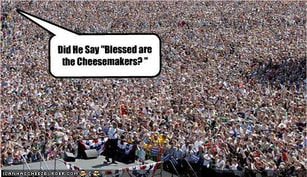
Well that was obviously a joke! – but it also a good reminder to us about how easily we misunderstand what Jesus has said, and how often we misunderstand about blessing. I was talking with you last week a little bit about the dangers of the so-called ‘prosperity gospel’ and about how it is easy to assume that when things are going well God is blessing us and conversely when things are hard that somehow, we have lost God’s favour. There really could not be a clearer reversal of that thinking than today’s Gospel passage (Luke 6.17-26)...
Now I imagine that the crowd was pretty astounded by that. And I don’t think as the church has become more institutionalized and more powerful that we have often been good at living out of that truth. And in reality, do we want to be poor and sorrowful and persecuted? Probably not! And seeking to be would not bring us blessing – it descriptive not prescriptive; when we are in these situations we are blessed, but we are not to seek those situations for their own sake, because then we put ourselves back in control; and the point is that it is when we find ourselves out of control and reliant on God, that we find ourselves blessed.
At other times, I think we find ourselves on both sides of this collision of blessings and woes. For in reality all of us sorrow sometimes; all of us hunger sometimes; poverty is relative, but most of us are not millionaires; most of us will have someone say something unpleasant about us at some point however much we strive to be nice and kind. So, we have a chance of blessing. But equally we are extraordinarily rich in the western world and not over generous; feasting is a real possibility and not just at morning tea; laughter is human and important and most of us like to receive compliments. And therefore, we are subject to the woes also.
We can read this account as a simple reversal of fortunes. As Jesus being on the side of the poor against the rich. And that can be a very helpful and powerful reading, especially when we find ourselves on the losing side of the power battles of our time. Jesus has in that famous phrase, a very clear ‘bias to the poor.’ He wanted to shift the power balance and that is what got him killed. However, there are other readings as well. Readings that remind us that Jesus did not exclude anyone, rich or poor, grieving or laughing. Pinned to the cross, Jesus held all our differences and embraced them all.
An obvious difference between a mountain top and a plain is the element of spaciousness. In Matthew Jesus is up on the mountain, able to see everything and tell us all from a great height how it should be. Here in Luke, Jesus does something much harder but also more helpful. He embraces the spaciousness of the plain, the level ground, where ideas, and people mingle and rub shoulders and share sweat and tears. On the plain things get muddied and mingled and misheard – it is as likely that the cheesemakers be blessed as anyone else on the plain.
What a blessing that is! That everyone has a chance of blessing in the economy of God. Blessing is not ‘reserved’ somehow for any kind of privileged few. No one is too poor, or for that matter too rich - what matters is our openness to letting God be God in our life. It helps to be poor and in need, because then we turn to God more readily than we think we have all our ducks in a row. But we can all be blessed. We just need to turn to God as RS Thomas says in his wonderful poem The Kingdom “and present yourself with your need only and the simple offering of your faith, green as a leaf.” Amen
By Penny Jones, 17 February 2019, @Milton Anglicans
 RSS Feed
RSS Feed